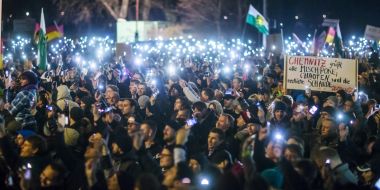Sanctuary churches: German pastors say they won't let refugees be sent back to persecution
Hundreds of churches in Germany are providing sanctuary for asylum seekers risking deportation.

There are currently 222 Catholic and Protestant Churches sheltering at least 411 refugees according to the German Ecumenical Committee on Church Asylum. The age-old custom is still respected by the authorities though it is not enshrined in German law.
The majority of these refugees are so-called 'Dublin cases' – a principle in EU law which means that refugees must seek asylum in the first country in which they land.
The churches that offer asylum feel bound by their Christian faith to protect people from deportation if there is reasonable doubt about their safe return.
They act as an intermediary between the refugees and the authorities to try and bring about a re-examination of the cases.
In an interview with the Telegraph, one family described their six-year-long journey through Europe as they were sent from one country to another.
Mehdi Gohari, his wife Lailoma Mohammdi, and their children Husnia, 7, and Ali, 1, landed in Greece having fled Afghanistan. The family are Hazaras, a Shia Afghan minority persecuted by the Taliban. Gohari said a member of the local Taliban had demanded to marry their daughter, Husnia, when she was 13 years old.
They tried to seek asylum in the Netherlands but had to escape to Germany as they were about to be deported.
"The officials told us 'It's not our problem. Go somewhere else'," Gohari said.
In Germany they faced deportation again before the Miriamgemeinde, a Protestant church in Frankfurt, intervened in November last year.
The church had to act swiftly and provide shelter at short notice. And it is far from a perfect solution. If the Goharis leave the shelter of the small church house where they are staying, they could again face deportation.
Their stay has cost the church about €3,000 so far, and the family are reliant on volunteers for help with their shopping and anything that requires leaving church property.
The Goharis case is currently under review.
The church pastor, Thomas Volz, told the Telegraph: "People have asked me, 'What do we do if they say no?'" says Mr Volz.
"I tell them, if that happens every Christian must decide for himself. We cannot keep them in sanctuary at the church if that happens. But we will not give the Goharis up to the police."
Church asylum is an unpopular custom among German politicians. According to Deutsche Welle, interior minister Thomas de Maiziere said in a radio interview that although he was against church asylum as a politician, as a Christian he said one could "occasionally have mercy – but we're only talking about maybe 10 cases per year".
At the end of February a new trial policy was agreed in which church asylum cases would be considered at both a local and federal level.
Asylum has become a more pressing concern as Germany's immigration figures are now second only to the United States. Around 200,000 people tried to seek asylum in the country last year, partly due to the influx from Syria. Since the end of January there have been concerns about the government trying to tighten controls on church asylum.
The growth of anti-Islamisation campaign group Pegida, which began protest marches in October, has also raised concerns about Germany's attitude toward asylum seekers. The protests originally started over plans for a new refugee centre in Dresden. But Christians and many others around the country joined anti-Pedgia protests, keen to show that immigrants are welcome in Germany. The counter-protests eventually dwarfed the size of the Pegida demonstrations.











